So, you’re thinking of learning AWS, but of course, you’ll need to know at least roughly how long it’s going to take you, right? AWS is huge, so finding an answer to how long it might take can be tricky. I remember logging into AWS for the first time (around 10 years ago now!) and being completely overwhelmed, so I understand how you may be feeling right about now.
How long will it take to learn the basics of AWS? You can start to understand AWS core services in a few days, gain practical knowledge with those core services in a few weeks, and in a month or two, you could expect to be undertaking professional work in AWS.
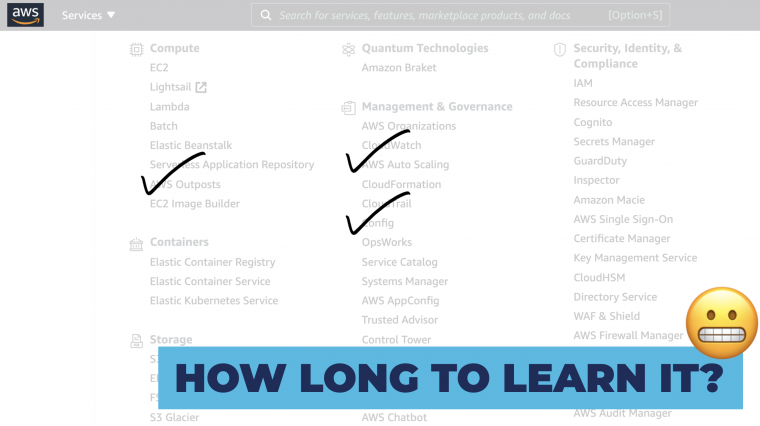
There’s two big questions I often get asked on the topic of how long to learn AWS, firstly that’s: what’s the relevancy of an IT background? And secondly: will I need to learn to code? Let’s discuss these topics first, then I’ll share some more general tips on structuring and speeding up your AWS learning.
There’s quite a lot to cover, so let’s get into it.
Does Background Experience (e.g. IT/Degree) Affect How Long Learning AWS Takes?
I often get asked: “Is AWS hard?”. And when I get asked this question, I think that the person asking actually means: “can a person like me, with my background / knowledge / capability learn AWS?”. The question isn’t “how hard is AWS?” the question is usually: “am I smart enough to learn AWS?”.
I’ll get straight to the point: it is possible for anyone of any background to learn AWS today, without any background knowledge or experience of the cloud, or IT. And, of course, I don’t expect you just to believe me—let me explain why I think having background experience isn’t much of an advantage anymore.
IT Backgrounds Don’t Matter As Much Anymore
It can indeed help if you have a background in computer science, or IT as some AWS concepts do overlap between these backgrounds and experiences. But, as I said, having some background experience isn’t necessarily always an advantage. Now I know this sounds a bit crazy, so let me explain why.
Given how fast the cloud world is moving and changing, having traditional IT experience is becoming less relevant to learning AWS. Why? Because AWS constantly release industry-changing services that redefine how we work with the cloud and require new skills and knowledge that doesn’t even exist yet.
The approaches and skills needed to use AWS today are different from the approaches needed even just a couple of years ago.
Pause to think about that for a second.
If you still don’t believe me, go read into serverless (I even have a guide for it: Serverless: An Ultimate Guide) and you’ll see what I mean. Serverless functions did not exist before 2014. All the concepts, ideas, and tools around serverless are brand new, even to people who work with the cloud currently.
The main point here is: having a background in IT isn’t necessarily going to speed up learning AWS. Yes, some experience helps, but it’s not worth worrying about, prior experience matters less than you might think.
Let’s move on. Another factor that’ll affect how long it takes you to learn AWS are the other skills that you’ll have to learn. And I know there’s one main skill that could be scaring you a little right now, and that’s coding.
Will I Need To Learn To Code To Learn AWS?
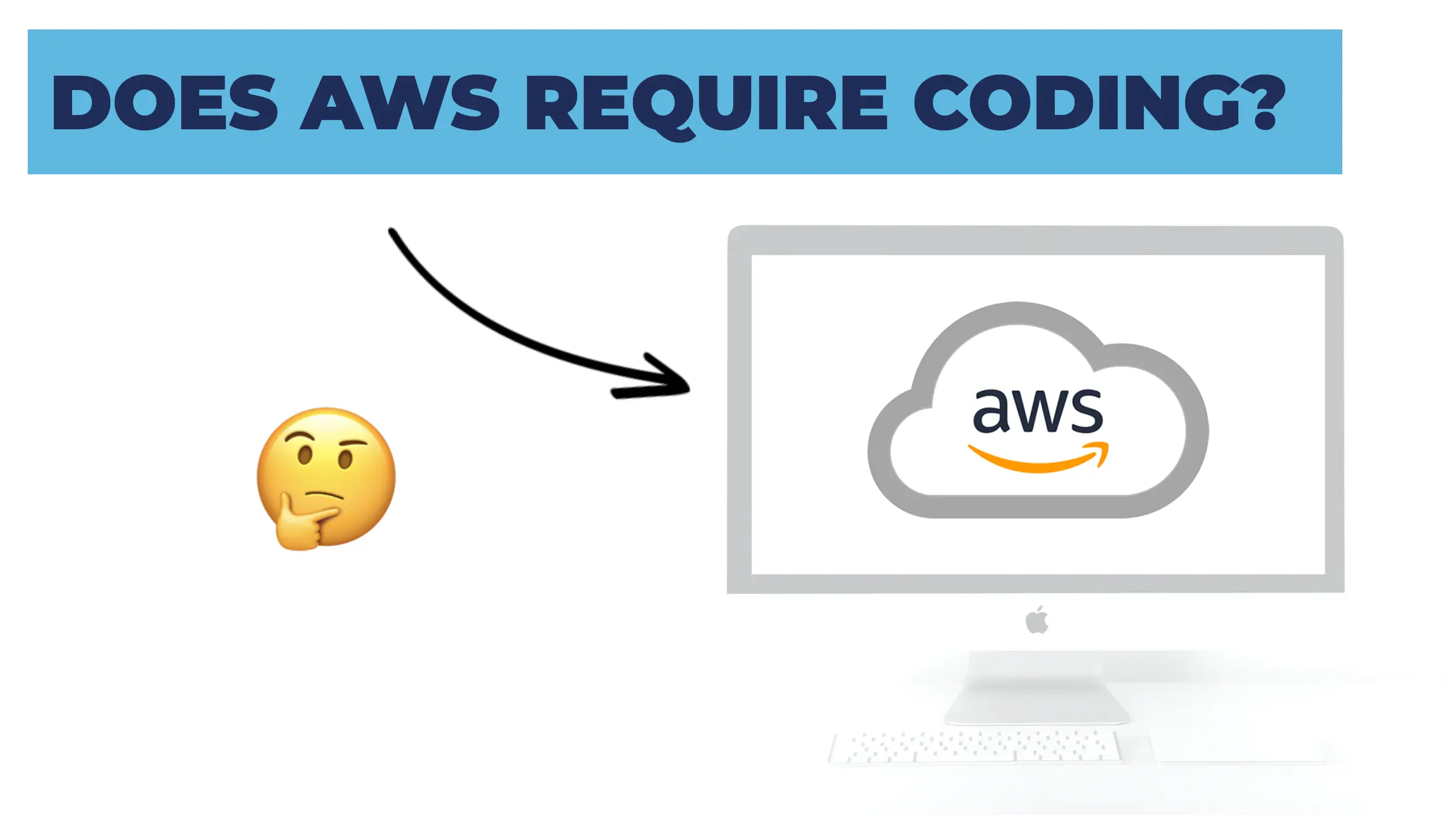
I imagine you’re keen to understand how much coding is involved in learning AWS. And coding is a big topic, so if you’re going to have to learn to code it’ll definitely affect your timeline of how long it takes to learn AWS.
As an aside, I have written about this topic in-depth before: Does AWS Require Coding? Understanding When You Might Need To Code., and similarly, I’ve written about: Do Cloud Engineers Code? But nevertheless, let’s run through some of the key points here today.
In fact, actually, before we get to those points, let me first tell you a quick story back from before I learned to code, then we can get back to our discussion on whether you’ll need to code when learning AWS.
I remember this day vividly as it was my induction at university. I asked the student who was giving our tour so many questions: “How long did it take you to code?”, “Is coding hard?”. To be honest with you, I was scared of coding.
Yet, here I am as a professional software engineer all those years later. I honestly never thought that I would find code “easy” or normal, but now it’s as second-nature as talking or walking. Code is scary at first, but all professional software engineers started off like you, it’s important to remind yourself of that.
With the story in mind, let’s get back to our discussion of whether you’ll need to code, as that would affect how long it takes you to learn AWS.
Will You Need To Learn To Code?
You won’t need coding to get started with AWS, but you will almost definitely need to learn to code at some point in your journey with AWS.
When you start out with AWS, you can quite easily do many tasks that don’t require any coding. You can deploy an S3 bucket, copy-paste some HTML files, and launch your own website. Or, you can go into the EC2 console, and launch a WordPress AMI without knowing any coding at all.
However, at some point, you will need some form of coding. There aren’t many jobs related to AWS that will require only manual work to be completed that don’t require any coding or automation. So whilst you can get definitely get started without coding, at some point you’re probably going to need to learn.
If you do want to look into learning to code, for languages I’d suggest you look into JavaScript if you’re interested in web development, or Python if you want to be more cloud, data or operations focused.
The main thing here is: you won’t need to learn to code as you start to learn AWS, but as you learn more you’ll want to figure out which type of role you might want, and start to understand if that particular role requires coding.
So we now know that background isn’t so important when it comes to learning AWS, we also know that you don’t need to code to get started with AWS, but that you’ll need to learn at some point. Now, another question in your mind right about now might be “can you speed up learning AWS?”
Can You Speed Up AWS learning? What Can You Do To Make Learning AWS Faster?
As with most of the previous topics we’ve discussed I’ve talked about this topic at length before, too: Where (And How) to Start Learning AWS as a Beginner. This particular article has been read by over 20,000 people last year, so I can highly suggest you read it. But, let me summarise it here.
I’ve got four different tips for you on how to speed up your AWS learning.
1. Focus On AWS Services Relevant To You
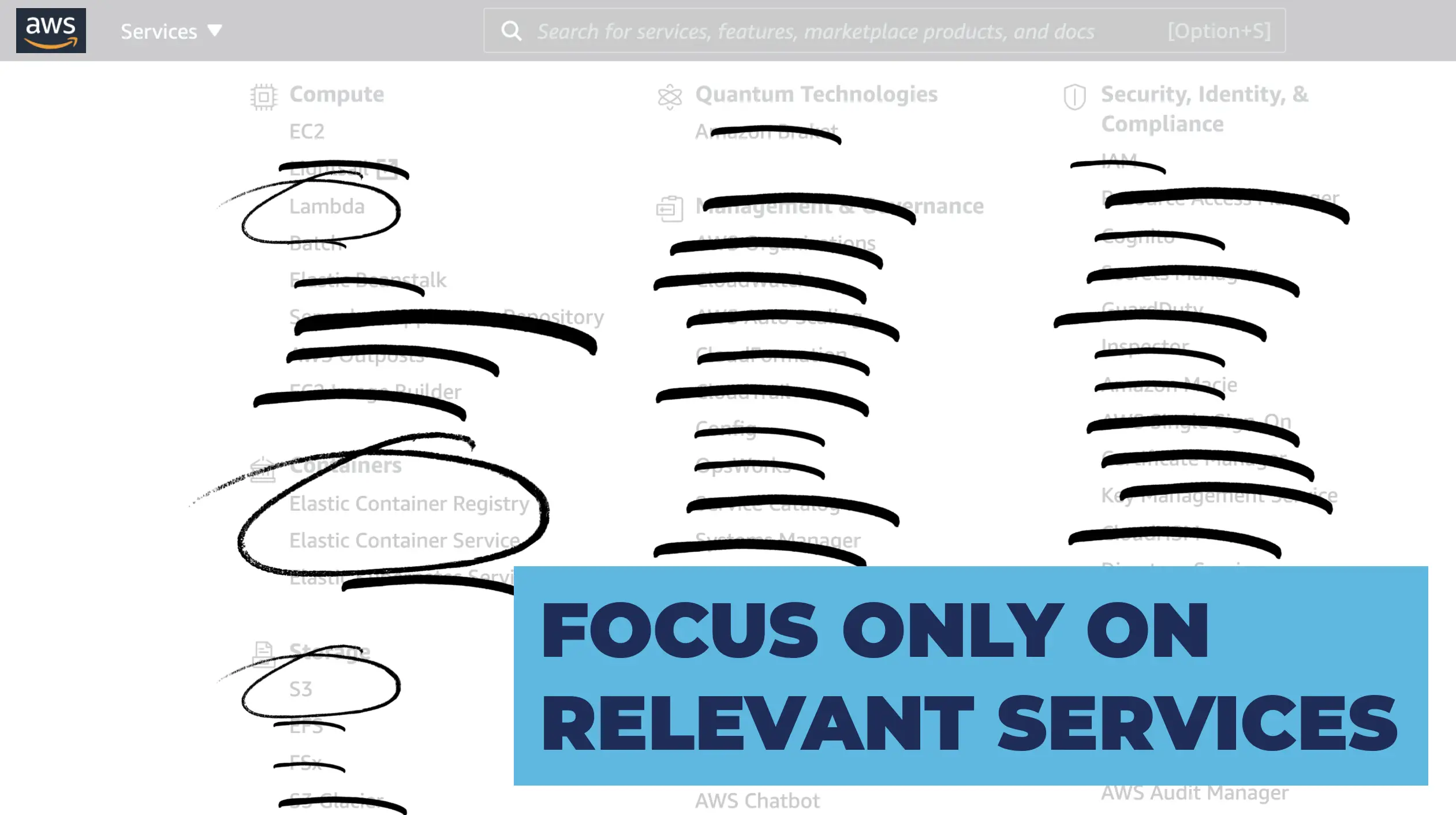
I certainly can’t download my knowledge into your brain—sorry!—but there are definitely ways to speed up your learning of AWS. Frankly speaking, the trick to learning AWS faster is about knowing what not to learn, rather than knowing what you should learn.
AWS is huge, no doubt, and it’s broken up into services, which now add up to well over 200 AWS services last time I checked—being honest, I don’t even bother checking anymore! So it’s going to be very important that you focus on the services that are important for the job that you want and nothing else.
But, how do you know which services to focus on?
Firstly, I’d suggest you spend some time on job sites, looking at different job specifications, and taking notes of the AWS services that your ideal job recommends. If you’re aiming to become a developer, it might be services like: ECS, EC2, S3, IAM, etc. If you’re looking at operations types roles, the services could be Systems Manager, Cloudwatch and Cloudtrail, etc.
Start to compile a hit list of services that apply to the job that you think you want. If you can, reach out to people who have the job title that you want, and ask them for their advice. Twitter is great for asking these questions.
2. Use The AWS Exams To Give Your Learning Structure
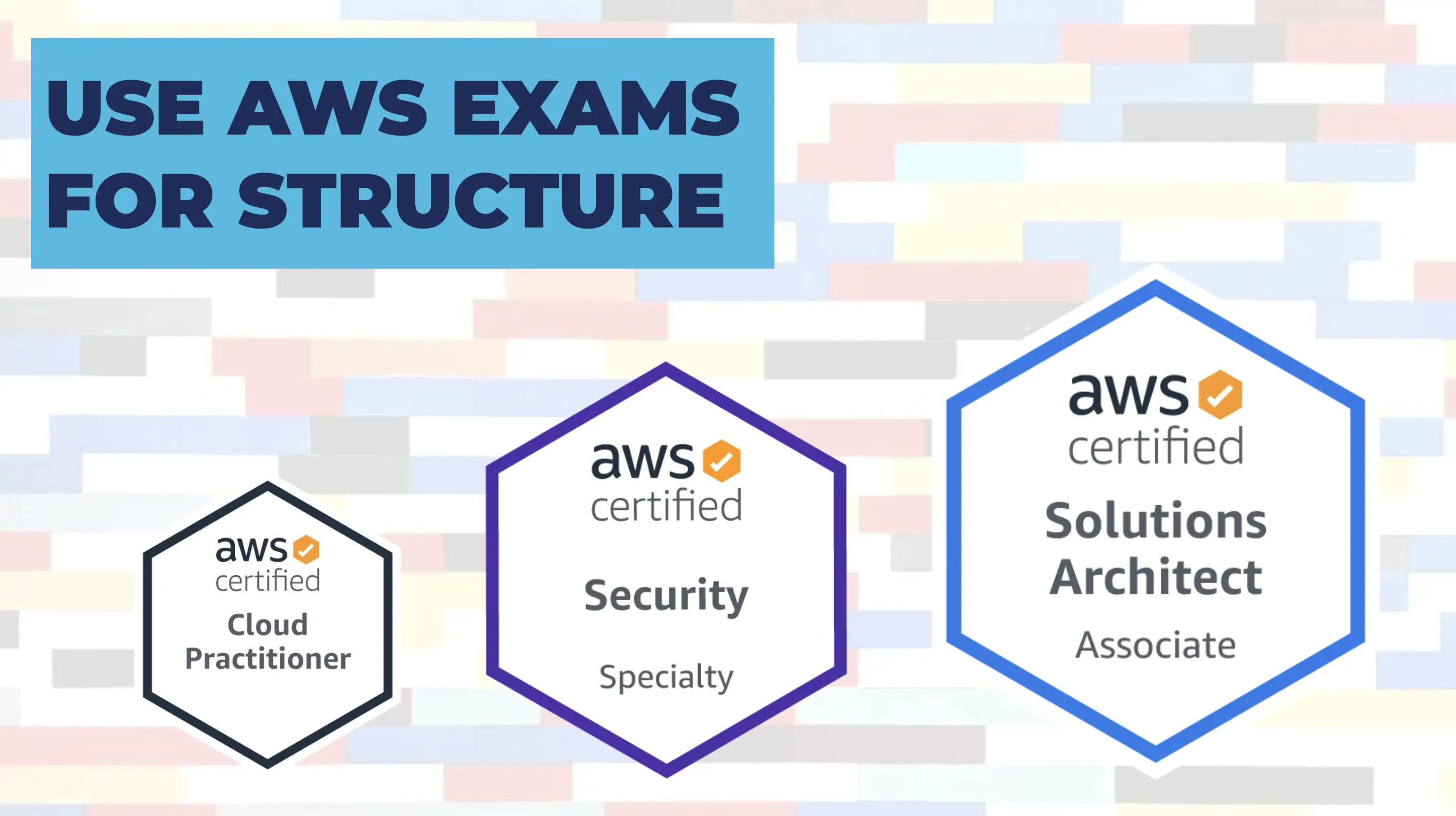
Another tip that will speed up your learning is structuring it. And for structure, look no further than the AWS exams. A lot of thought goes into the AWS exams and the topics covered, so you can trust they’re a good guide. You don’t even have to sit the exam to follow their structure.
To research the exams I highly suggest you check out this page: AWS exams preparations page, which has everything you need. Read the PDF blueprints under each exam to figure out which one you’d want to follow.
And I must mention that if you’re looking to take the exams, I did a huge write up of: Best Resources For AWS Certifications: An Extensive & Opinionated Guide (So You Pass The First Time!). It’s the longest article I’ve ever written and it’s full of useful resources, that took me over a week to sit down and put together—I’d say definitely worth bookmarking for later.
And whilst you don’t need to sit the exams to learn and get into AWS if you are curious about the cost of the exams themselves, I’ve also broken that down for you: How Much Do AWS Certifications Cost? Including All The Extras.
The main point here is that using AWS exams can structure your learning in a nice way, and can help keep your focus where it needs to be, rather than getting distracted or falling down the many rabbit holes.
3. Why Leveraging Online AWS Communities/Forums Is So Important And Useful
If you’re going to learn something like AWS, why take on the task alone? There are so many online communities of people just like you who are learning to get into cloud and AWS. You’d be foolish to ignore or not leverage them, as they can help you find the useful resources and ignore the trash.
To get you started, here’s a handful that I like personally:
- ACloudGuru Forum
- The Cloud Resume Challenge
- r/AWSCertifications (Reddit)
- 100DaysOfCloud
- Twitter (follow me, say hi)
Hey 👋 It’s Lou (the author). Can I briefly pause you for a moment? Based on my 1000’s of hours of research, mentoring and coaching people in the cloud industry, I have found a couple of courses and books that have really made a difference to those I’ve helped learn cloud and break into tech in general.
Which cloud provider to start with? People always ask me: “Which cloud provider should I learn? AWS? GCP? Azure?“. I have always recommended AWS. Why? Well—in short—because AWS is “the biggest” (source). To get started, I suggest you take the AWS Certified Cloud Practitioner and also the Jon Bonso Practice Exams For more about why I recommend both of these, check out this article: best resources for AWS Certifications.
How do you write a resume for cloud? It’s not just certs that will land you a job. You must understand the hiring process. Throughout all my research, the one best resource I found for understanding the tech hiring process is: The Tech Resume: Inside Out. I’m featured in the book, and my recommendation is on the home page. Seriously, it’s good! And very well researched.
Looking to get hands-on? 100’s of people have landed jobs from completing the Cloud Resume Challenge. I love this community challenge so much that I did a 21 part series about it on YouTube! The author, Forrest made an incredible book, The Cloud Resume Challenge Book, that is packed with insights on learning and landing a job in cloud. I highly recommend it.
Note: The links above do give a small commission, but I spend a ton of time researching, and I wholeheartedly recommend them. Also, all earnings are re-invested in the community and contribute The Open Up The Cloud Mission.
- 2023 Summary: Data Driven Stories About The Cloud - December 31, 2023
- 2022 Summary: The Open Up The Cloud System - January 1, 2023
- Open Up The Cloud Newsletter #30 (January Recap 2022) - March 1, 2022
And finally, the last tip to speed up your AWS learning for today is a feature from ACloudGuru called the ACloudGuru sandbox. I think the sandbox is really cool for AWS learning, let me show you how it works.
4. Try the ACloudGuru Sandbox
This might seem like a slightly odd recommendation out of the blue, but there’s a company called ACloudGuru (who are worth checking out in general) who have a feature of their membership called the cloud sandboxes, which is an incredible resource to speed up your AWS learning. But how?
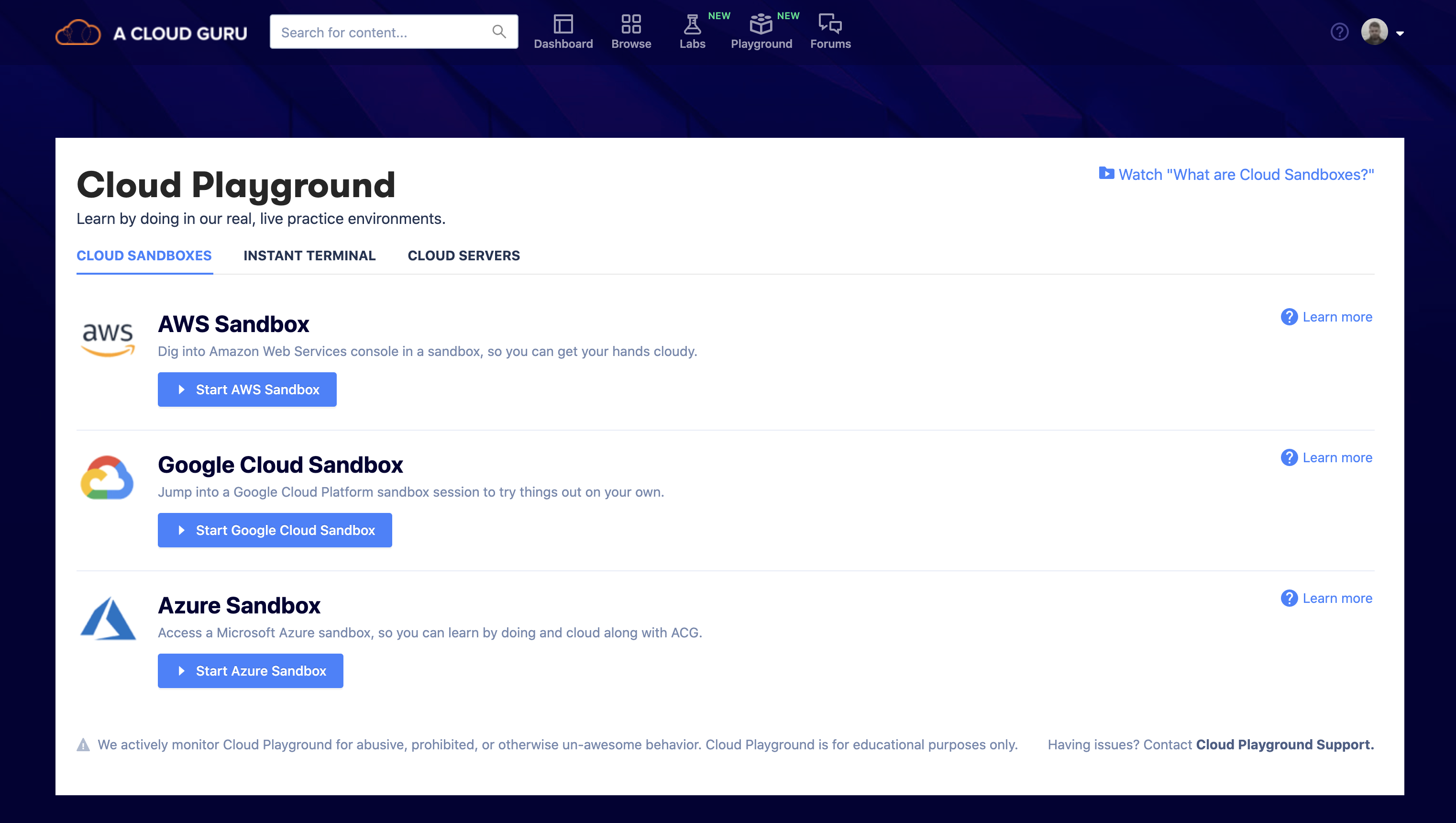

The reason I mention the feature in this section about learning AWS fast is because the sandboxes give you an AWS environment you can play in without fear of billing, security, etc. When you’re not stressing about these things you are free to move so much quicker with your learning.
If you want to access the sandbox you’ll have to sign up for an ACloudGuru membership (I’m not affiliate to them in any way… yet!) which does have a cost associated. But, if you have the cash, I seriously think it’s worth considering as it can speed up your learning considerably when you’re not worrying about bills and security vulnerabilities.
You can hear more about my thoughts on the sandbox in this video:
And on that note that ends the four tips about how to speed learning AWS. Hopefully you were able to pick up some tips from the article that you can now look into, or at least bookmark for later.
So, How Long Will It Take You To Learn AWS?
As we said through the article, prior experience isn’t really going to affect you that much in the time it takes to learn AWS, and you’ll need to figure out if coding is required for the type of job that you want with AWS.
As I said at the start, it’ll take you a matter of days to understand AWS at a high-level in a few days, you can then gain practical knowledge with core services in a few weeks, and in a month or two, you could expect to be undertaking professional work in AWS.
But also don’t forget also to apply the tips that we discussed today:
- Step 1: Understand the job role you want and what services you’ll need.
- Step 2: Make a plan, this could be based on an AWS exam.
- Step 3: Get hands-on immediately (maybe try the acloudguru sandbox)
I hope that you picked up at least a few tips along the way today, and I wish you all the best in your cloud learning journey!
If you’re looking to get into cloud and serverless, check out: My (highly!) recommended courses to learn cloud engineering. I also write a newsletter every single month, which covers the main things which are going on in cloud engineering, you can find out more and see examples / past issues here.
Speak soon, cloud friend! ✌️
- 2023 Summary: Data Driven Stories About The Cloud - December 31, 2023
- 2022 Summary: The Open Up The Cloud System - January 1, 2023
- Open Up The Cloud Newsletter #30 (January Recap 2022) - March 1, 2022